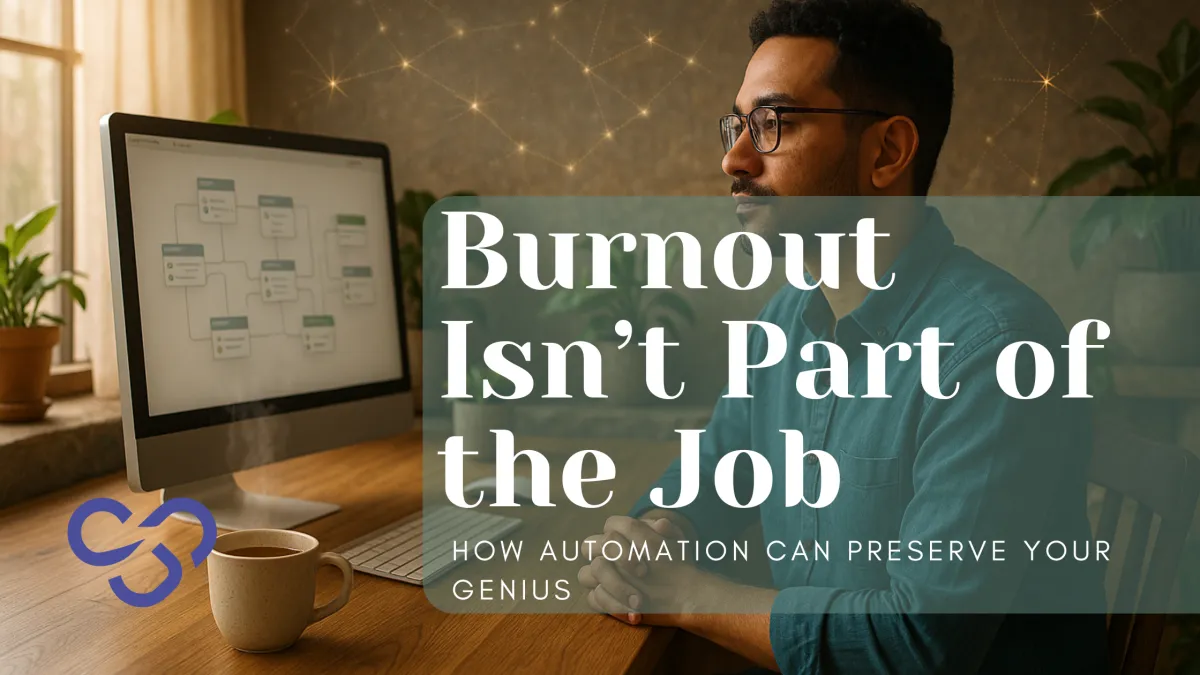
Burnout Isn’t Part of the Job
How Automation Can Preserve Your Genius
Ten Ways Automation Preserves Your Genius
As a visionary professional, your brilliance lies in connecting dots others can't see, creating innovative solutions, and inspiring transformation in your clients and community.
Yet somewhere between managing calendars, following up on leads, and drowning in administrative tasks, that spark of genius gets buried under an avalanche of busy work.
If you're a coach, consultant, therapist, or speaker who started this journey to make a meaningful impact, you've likely discovered a painful truth: the very systems that are supposed to support your practice often consume the energy you need for your most important work.
Burnout isn't an inevitable occupational hazard, it's a symptom of working against your natural strengths instead of leveraging them.
The solution isn't working harder or longer hours.
You can choose to create intelligent systems that handle the predictable so you can focus on the profound.

The Hidden Cost of Manual Operations
Before diving into solutions, let's acknowledge what manual business management costs visionary professionals.
When you're manually tracking client communications, scheduling appointments one by one, or spending hours creating proposals from scratch, you're losing time and depleting the cognitive resources that fuel your innovative thinking.
Neurodivergent professionals often face additional challenges in traditional business environments.
The executive function demands of constant task-switching, remembering follow-up deadlines, and maintaining multiple client relationships can be overwhelming when handled manually.
This is where thoughtful automation is essential for sustainable results.
For many in our diverse professional community platform, the breakthrough moment comes when they realise that automating routine tasks does not mean becoming less human, it allows more authenticity in your vocation.

1. Intelligent Client Intake and Onboarding
Your first interaction with a potential client sets the tone for everything that follows. Manual intake processes often mean delayed responses, inconsistent information gathering, and missed opportunities to demonstrate your professionalism from day one.
Automated intake systems can capture essential client information, schedule initial consultations, and even begin the relationship-building process before you've had your first conversation.
This doesn't replace the human connection, it creates space for deeper, more meaningful interactions by handling the logistics seamlessly.
Consider implementing automated welcome sequences that introduce new clients to your process, share relevant resources, and set clear expectations.
This trauma-informed approach to onboarding helps clients feel secure and informed, reducing anxiety for both parties.

2. Dynamic Scheduling That Respects Boundaries
Calendar management might seem simple, but for visionary professionals juggling multiple projects, speaking engagements, and client sessions, it becomes a complex puzzle.
Automated scheduling tools can integrate your availability across platforms, buffer time between sessions, and even block out focused work periods automatically.
The key is creating systems that protect your energy rhythms.
If you do your best creative work in the morning, automation can ensure that's when you're most protected from interruptions.
If you need recovery time after intensive client sessions, your system can automatically build in those buffers.
Smart scheduling also means connecting with your CRM to ensure you have relevant client information at your fingertips before each interaction, eliminating the mental load of preparation and context-switching.

3. Personalised Communication at Scale
One of the biggest fears about automation is losing the personal touch that makes your work special.
The reality is that well-designed automation allows for more personalisation, not less. When systems handle routine communications, you can invest more energy in meaningful, customised interactions.
Automated email sequences can be tailored to different client types, stages of engagement, and specific interests.
Your system can track client preferences, important dates, and conversation history, providing you with rich context for every interaction.
For coaches working in our group for diverse coaches, this might mean automated check-ins between sessions that are customised based on each client's goals and challenges.
The automation handles the timing and delivery, while you craft the personal message that speaks directly to their journey.

4. Content Creation and Distribution Workflows
Visionary leaders often have more ideas than time to execute them.
Automation can transform your content creation process from a time-consuming struggle into a streamlined system that amplifies your voice across multiple channels.
Create templates and workflows that allow you to capture ideas quickly, develop them systematically, and distribute them across your preferred platforms.
This might include automated social media scheduling, blog post formatting, or even turning your session notes into valuable content for your community.
The goal isn't to become a content machine, but to ensure your insights reach the people who need them most, without consuming all your creative energy in the distribution process.

5. Financial Operations and Invoicing
Nothing kills visionary momentum like spending your creative peak hours on invoicing and payment follow-ups.
Automated financial systems can handle recurring billing, send payment reminders, track expenses, and even generate financial reports that help you make strategic decisions about your practice.
For many professionals, automated invoicing means the difference between consistent cash flow and the feast-or-famine cycle that contributes to burnout.
When payments are predictable and administrative tasks are handled automatically, you can focus on serving clients and growing your impact.

6. Lead Nurturing and Relationship Management
Building meaningful professional relationships shouldn't feel like a full-time job on top of your actual full-time job.
Automated CRM systems can help you stay connected with your network, follow up on opportunities, and nurture relationships without constant manual oversight.
This is particularly valuable for professionals seeking alternatives to traditional networking platforms.
Our visionary business network approach recognises that relationship-building happens over time, through consistent value delivery rather than transactional interactions.
Automation can remind you when it's time to check in with a colleague, suggest relevant content to share with your network, or flag opportunities for collaboration based on the projects and skills you're tracking in your system.

7. Project and Collaboration Management
When you're working on multiple client projects or collaborating with other professionals, keeping track of deadlines, deliverables, and communication can become overwhelming. Automated project management systems ensure nothing falls through the cracks while providing transparency for all involved parties.
The ability to find collaborators by project and skillset becomes much more powerful when supported by automated matching and notification systems. Instead of manually searching through your network, you can set up alerts for specific types of opportunities or expertise needs.

8. Learning and Development Tracking
Visionary professionals are often continuous learners, attending workshops, completing certifications, and staying current with industry developments.
Automated systems can track your professional development, remind you of renewal deadlines, and even suggest learning opportunities based on your goals and interests.
This systematic approach to growth ensures you're always building on your expertise without the mental load of remembering every deadline or opportunity.

9. Data-Driven Decision Making
One of the most powerful aspects of business automation is the data insights it provides. Instead of making decisions based on gut feelings or incomplete information, automated systems can track key metrics about your practice and present them in digestible formats.
Understanding which services are most profitable, which marketing efforts generate the best clients, or what times of year are busiest can help you make strategic decisions that prevent burnout and maximise impact.

10. Community and Network Engagement
Building and maintaining professional community connections is essential for visionary professionals, but it shouldn't consume all your networking energy.
Automated systems can help you engage consistently with your professional community, whether that's through our expertease.network platform or other professional networks.
This might include automated birthday reminders, sharing relevant content with specific network segments, or notifications about collaboration opportunities that match your interests and availability.
Creating Your Automation Strategy
The key to successful business automation for coaches and speakers isn't implementing every possible tool, it's strategically choosing the bespoke automations that address your specific energy drains and leverage your natural strengths.
Start by tracking where you currently spend time on administrative tasks versus high-value work. Look for patterns in what drains your energy most quickly.
Are you constantly interrupted by scheduling requests?
Do you spend too much time on invoicing?
Are you missing follow-up opportunities because you can't track them all manually?
Pay particular attention to tasks that require significant executive function or working memory.
These are often the best candidates for automation, as they can free up cognitive resources for the work that truly requires your unique perspective.
Building Safe Networking Spaces Through Technology
One of the unexpected benefits of thoughtful automation is how it can create safer, more inclusive networking experiences.
When systems handle logistics and provide clear structure, it reduces the social and cognitive load that can make networking challenging for many professionals.
Automated systems can ensure consistent follow-up, provide conversation starters based on shared interests, and create structured ways to engage that don't rely solely on extroverted networking styles.
This trauma-informed approach to professional networking recognises that not everyone thrives in traditional networking environments.
The Future of Visionary Work
As artificial intelligence and automation tools become more sophisticated, the opportunities for visionary professionals to focus on their highest-value work will only increase.
The question isn't whether to embrace automation, but how to do it in a way that amplifies your unique strengths rather than replacing human connection.
The most effective visionary professionals of the future will be those who learn to dance with technology, using it to handle the predictable while preserving their energy for the profound, unexpected, and deeply human aspects of their work.
Taking the First Step
If you're feeling overwhelmed by the prospect of automating your practice, start small. Choose one area where you're currently spending significant time on routine tasks and explore automation options for that specific challenge.
Remember automation is an opportunity for you to become more strategic with your humanity.
When systems handle the routine, you can show up more fully for the work that truly matters.
Your genius is meant to be shared, amplified, and preserved for the long-term impact you're here to create.
Automation is your wand for efficiency, sustainability, scalability, and maintaining the spark that makes your work transformational.
The future of your practice doesn't have to include burnout.
With thoughtful automation, you can build a business that supports your visionary work instead of consuming it.


